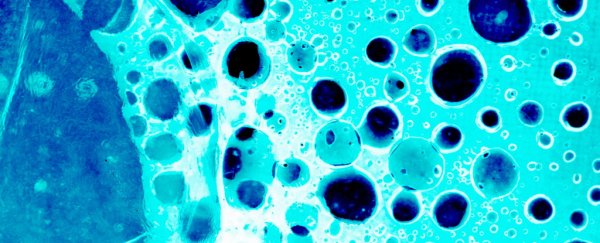Scientists are hailing the discovery of a new type of drug shown to be effective against one of the deadliest forms of cancer - metastatic pancreatic cancer - and with no obvious side-effects.
IMM-101 works by 'waking up' the immune system to attack tumours, which could make a big difference in treating the disease, since pancreatic cancer of this type is usually able to hide from and protect itself against the body's natural defences.
By adding IMM-101 to the existing chemotherapy drug, gemcitabine, researchers from St George's, University of London in the UK were able to break through the protective cells shielding pancreatic tumours, and extend the lifespan of patients whose cancer had spread outside of the original location.
"To me it's really exciting," lead researcher Angus Dalgleish told Sarah Boseley at The Guardian. "This is the first time we have got an immunotherapy that is a really good candidate to help control pancreatic cancer, which is one of the biggest killing diseases. Its incidence nearly matches its mortality. It is absolutely staggering."
Patients given the new immunotherapy drug felt better than those taking standard chemotherapy treatment, Dalgleish reported, and no toxic side-effects were noted.
The early signs are promising, but it's not quite a miracle cure just yet. Only a relatively small number of people (110) were included in the trial, and over the whole sample there was no significant survival benefit.
This is because the drug was more effective in treating cancer that had advanced to the stage where it was identified as having spread through the body (metastatic cancer), as opposed to cancer that had remained localised at the site of the primary tumour.
In the study, the median survival rate increased from 4.4 months to 8 months in patients with metastatic pancreatic cancer – some patients taking the new treatment lived for over a year, and one survived for nearly three years. But the drug didn't seem to help those whose cancer had stayed local, rather than spreading to secondary sites.
Dalgleish has been testing the effects of IMM-101 for a number of years, and has previously found it effective in tackling skin and lung cancer. But the new results are even more promising, because pancreatic cancer is so well-protected and lodged so deeply in the body.
"It's rather like depth-charging the immune system which has been sent to sleep," Dalgleish told The Guardian.
Now there are plans for a broader study, looking exclusively at people with metastatic pancreatic cancer.
And help is badly needed. Only 18 percent of patients with advanced pancreatic cancer survive a year, and if the tumours become metastatic, survival rates are even shorter - across the world, the median average is between 2.8 and 5.7 months.
Hopefully, with further research completed, IMM-101 might be able to improve upon some of those stats.
"I have seen first-hand that this is a hugely beneficial treatment for patients and I'd like to see it translated to every hospital in the country," Dalgliesh said in a statement. "I believe IMM-101 could revolutionise the way this cancer is treated globally."
The findings are published in the British Journal of Cancer.
